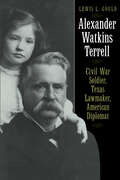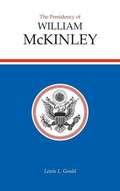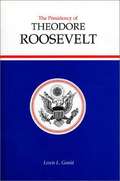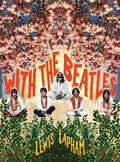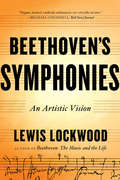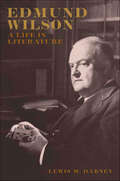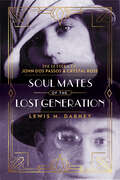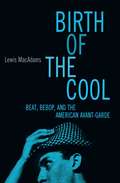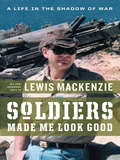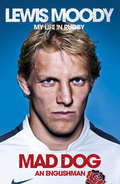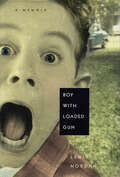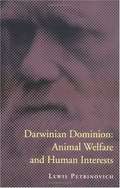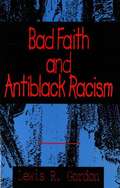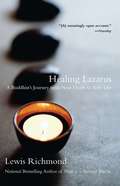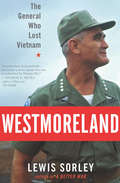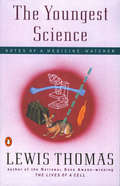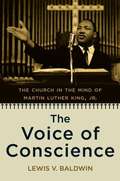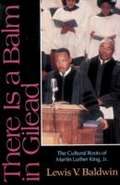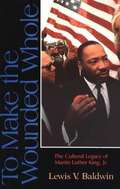- Table View
- List View
Alexander Watkins Terrell: Civil War Soldier, Texas Lawmaker, American Diplomat (Focus on American History Series)
by Lewis L. GouldAlexander Terrell's career placed him at the center of some of the most pivotal events in nineteenth- and early twentieth-century history, ranging from the Civil War to Emperor Maximilian's reign over Mexico and an Armenian genocide under the Ottoman Empire. Alexander Watkins Terrell at last provides the first complete biographical portrait of this complex figure. Born in Virginia in 1827, Terrell moved to Texas in 1852, rising to the rank of Confederate brigadier general when the Civil War erupted. Afterwards, he briefly served in Maximilian's army before returning to Texas, where he was elected to four terms in the state Senate and three terms in the House. President Grover Cleveland appointed him minister to the Ottoman Empire, dispatching him to Turkey and the Middle East for four years while the issues surrounding the existence of Christians in a Muslim empire stoked violent confrontations there. His other accomplishments included writing legislation that created the Texas Railroad Commission and what became the Permanent University Fund (the cornerstone of the University of Texas's multibillion-dollar endowment). In this balanced exploration of Terrell's life, Gould also examines Terrell's views on race, the impact of the charges of cowardice in the Civil War that dogged him, and his spiritual searching beyond the established religions of his time. In his rich and varied life, Alexander Watkins Terrell experienced aspects of nineteenth-century Texas and American history whose effects have continued down to the present day.
The Presidency Of William McKinley
by Lewis L. GouldIn this interpretation of the McKinley presidency Lewis L. Gould contends that William McKinley was the first modern president. Making use of extensive original research in manuscript collections in the United States, Great Britain, and France, Gould argues that during McKinley's four and a half years in the White House the executive office began to resemble the institution as the twentieth century would know it. He rejects the erroneous stereotypes that have long obscured McKinley's historical significance: McKinley as the compliant agent of Mark Hanna or as an irresolute executive in the Cuban crisis that led to war with Spain. He contends that McKinley is an important figure in the history of the United States because of the large contributions he made to the strengthening and broadening of the power of the chief executive. While this volume touches on many aspects of McKinley's leadership, the core of it relates to the coming of the Spanish-American War, the president's conduct of the war itself, and the emergence of an American empire from 1898 to 1900. According to Gould, the Spanish-American War was not the result presidential weakness or of cowardice before public hysteria. McKinley sought to persuade Spain to relinquish Cuba peacefully, turning to war only when it became apparent that Madrid would never acquiesce. During the war, McKinley effectively directed the American military effort and the diplomacy that brought territorial acquisitions and peace. The process of making peace with Spain--involving, as it did, American annexation of the Philippines--and of securing the ratification of the resulting treaty in the Senate underscored McKinley's expansive view of presidential power. He functioned as chief diplomat, from the sending of senators on the peace commission to the personal supervision of the terms of the negotiation. At home he made tours of the West and South in 1898 to lead popular opinion to his position as no president had done before him. For the Senate he evidenced a readiness to dispense patronage, woo votes with personal persuasion, and marshal the resources of the political system behind his treaty. Later episodes in McKinley's administration support Gould's thesis. In administering Puerto Rico and Cuba and in suppressing an insurrection in the Philippines, McKinley relied further on the war power and continued to shape affairs from the White House. He sent troops to china during the Boxer Rebellion in 1900 without congressional authorization, governed the new possessions through presidential commissions, and allowed Capitol Hill only a subsidiary role in the process. By 1901 the nation had an empire and a president whose manner and bearing anticipated the imperial executives of six decades later. Gould does not argue that McKinley was a great president. He maintains, instead, that what McKinley contributed to the office, the examples he offered and the precedents he set make him an important figure in the emergence of the modern presidency in this century.
The Presidency of Theodore Roosevelt (American Presidency Series)
by Lewis L. GouldEight decades after he left the White House, Theodore Roosevelt remains the most exciting of the twentieth-century presidents. Candidates evoke the name of "Teddy" Roosevelt to show that they are strong in foreign policy and devoted to the environment. His phrases—the "bully pulpit," the "big stick," and the "strenuous life"—are part of the language. Roosevelt was more than an important contributor to the evolution of the modern institution of the presidency. He personalized the office in a way that had not occurred since Andrew Jackson. In many respects, none of Roosevelt's successors since 1909 has equaled his impact on the popular mind. Accounts of Roosevelt's life usually emphasize the departures that he made in how the presidency was conducted. While he brought freshness, youth, and energy to his duties, he did not work in a historical vacuum. William McKinley had revitalized the office between 1897 and 1901, and Roosevelt built on those accomplishments. In time his flair and charisma eclipsed the work of his predecessor. Nonetheless, Roosevelt was a key player in a general strengthening of the presidency that took place during the quarter century after the election of 1896. It does not diminish his record to recognize that he was never the sole architect of the modern presidency in its formative stage.
With the Beatles
by Lewis LaphamHalfway between the summer of love and the Tet offensive, the Beatles went to India to study with the Maharishi--and Lewis Lapham, esteemed Harper's editor and award-winning writer, was there. WITH THE BEATLES is a remarkable book of cultural commentary on that seminal '60s moment.The ashram in Rishikesh, India was the ultimate '60s scene: the Beatles, Donovan, Mia Farrow, a stray Beach Boy and other '60s icons gathered along the shores of the Ganges--amidst paisley and incense and flowers and guitars--to meditate at the feet of the Maharishi Mahesh Yogi. The February 1968 gathering received such frenzied, world-wide attention that it is still considered a significant, early encounter between Western pop culture and the mystical East. And Lewis Lapham was the only journalist allowed inside.And what went on inside the compound has long been the subject of wild speculation and rampant rumor. The Beatles said they wrote some of their greatest songs there . . . and yet they also came away bitterly disillusioned. In WITH THE BEATLES, Lewis Lapham finally tells the whole story.
Mark Twain's Correspondence with Henry Huttleston Rogers, 1893-1909
by Lewis LearyThis collection of correspondence between Clemens and Rogers documents Clemens's progress from financial disaster, with the Paige typesetter and Webster & Company, to renewed prosperity under the steady, skillful hand of H. H. Rogers.
William Faulkner of Yoknapatawpha County
by Lewis LearyOne of a series entitled Twentieth Century American Writers.
Beethoven's Symphonies: An Artistic Vision
by Lewis LockwoodAn exploration of the unswerving artistic vision underlying Beethoven’s symphonies, from one of the world’s leading scholars of the composer’s works. More than any other composer, Beethoven left to posterity a vast body of material that documents the early stages of almost everything he wrote. From this trove of sketchbooks, Lewis Lockwood draws us into the composer’s mind, unveiling a creative process of astonishing scope and originality. For musicians and nonmusicians alike, Beethoven’s symphonies stand at the summit of artistic achievement, loved today as they were two hundred years ago for their emotional cogency, variety, and unprecedented individuality. Beethoven labored to complete nine of them over his lifetime—a quarter of Mozart’s output and a tenth of Haydn’s—yet no musical works are more iconic, more indelibly stamped on the memory of anyone who has heard them. They are the products of an imagination that drove the composer to build out of the highest musical traditions of the past something startlingly new. Lockwood brings to bear a long career of studying the surviving sources that yield insight into Beethoven’s creative work, including concept sketches for symphonies that were never finished. From these, Lockwood offers fascinating revelations into the historical and biographical circumstances in which the symphonies were composed. In this compelling story of Beethoven’s singular ambition, Lockwood introduces readers to the symphonies as individual artworks, broadly tracing their genesis against the backdrop of political upheavals, concert life, and their relationship to his major works in other genres. From the first symphonies, written during his emerging deafness, to the monumental Ninth, Lockwood brings to life Beethoven’s lifelong passion to compose works of unsurpassed beauty.
Edmund Wilson: A Life in Literature
by Lewis M. DabneyFrom the Jazz Age through the McCarthy era, Edmund Wilson (1895-1972) stood at the center of the American cultural scene. In his own youth a crucial champion of the young Ernest Hemingway and F. Scott Fitzgerald, Wilson went on to write three classics of literary and intellectual history (Axel's Castle, To the Finland Station, and Patriotic Gore), searching reportage, and criticism that has outlasted many of its subjects. Wilson documented his unruly private life--a formative love affair with Edna St. Vincent Millay, a tempestuous marriage to Mary McCarthy, and volatile friendships with Fitzgerald and Vladimir Nabokov, among others--in openly erotic fiction and journals, but Lewis Dabney is the first writer to integrate the life and work.Dabney traces the critic's intellectual development, from son of small-town New Jersey gentry to America's last great renaissance man, a deep commentator on everything from the Russian classics to Native American rituals to the Dead Sea Scrolls. Along the way, Dabney shows why Wilson was and has remained--in his cosmopolitanism and trenchant nonconformity--a model for young writers and intellectuals, as well as the favorite critic of the general reader. Edmund Wilson will be recognized as the lasting biography of this brilliant man whose life reflected so much of the cultural, social, and human experience of a turbulent century.
Soul Mates of the Lost Generation: The Letters of John Dos Passos and Crystal Ross
by Lewis M. Dabney IIISoul Mates of the Lost Generation recovers for contemporary readers one of the last great collections of letters of the Jazz Age. It is the correspondence between the pioneering novelist John Dos Passos and a young woman named Crystal Ross, to whom he was engaged and who reveals herself as one of the truly daring, vivacious spirits of that extraordinary time. Before his passing in 2015, Ross’s son, the esteemed literary scholar Lewis M. Dabney, completed a dual biography of the couple’s time together based on this rare correspondence.The bulk of the letters were written between 1923 and 1928, during Dos Passos’s first major creative period. The letters relate scenes from the pair’s life in the rich culture of Paris in the 1920s and their association with Hemingway, the Fitzgeralds, and other figures of literary modernism. Engaged in 1924, Dos Passos and Ross often corresponded about their ongoing work and the work of others in Dos Passos’s circle. Dos Passos introduced his fiancée to Hemingway, and the couple accompanied him and other writers on an early trip to Pamplona, the setting of The Sun Also Rises, in which Ross makes a cameo appearance. This collection of never-before-seen letters offers rare insights into the life of the influential modernist author of Manhattan Transfer, The 42nd Parallel, and The Big Money, and into that of a remarkably independent, fascinating woman.
Birth of the Cool
by Lewis MacadamsMiles Davis and Juliette Greco, Jackson Pollock and Jack Kerouac, Marlon Brando and Bob Dylan and William Burroughs. What do all these people have in common? Fame, of course, and undeniable talent. But most of all, they were cool. Birth of the Cool is a stunningly illustrated, brilliantly written cultural history of the American avant-garde in the 1940s and 1950s -- the decades in which cool was born. From intimate interviews with cool icons like poet Allen Ginsberg, bop saxophonist Jackie McLean, and Living Theatre cofounder Judith Malina, award-winning journalist and poet Lewis MacAdams extracts the essence of cool. Taking us inside the most influential and experimental art movements of the twentieth century -- from the Harlem jazz joints where Dizzy Gillespie and Charlie Parker invented bebop to the back room at Max's Kansas City when Andy Warhol was holding court to backstage at the Newport Folk Festival the night Bob Dylan went electric, from Surrealism to the Black Mountain School to Zen -- MacAdams traces the evolution of cool from the very fringes of society to the mainstream. Born of World War II, raised on atomic-age paranoia, cast out of the culture by the realities of racism and the insanity of the Cold War, cool is now, perversely, as conventional as you can get. Allen Ginsberg suited up for Gap ads. Volvo appropriated a phrase from Jack Kerouac's On the Road for its TV commercials. How one became the other is a terrific story, and it is presented here in a gorgeous package, rich with the coolest photographs of the black-and-white era from Robert Doisneau, Henri Cartier-Bresson, Man Ray, and many others. Drawing a direct line between Lester Young wearing his pork-pie hat and his crepe-sole shoes staring out his hotel window at Birdland to the author's three-year-old daughter saying "cool" while watching a Scooby-Doo cartoon at the cusp of a new millennium, Birth of the Cool is a cool book about a hot subject...maybe even the coolest book ever.
Soldiers Made Me Look Good
by Lewis MackenzieSince retiring from the Armed Forces, Major-General Lewis MacKenzie has not stayed out of the spotlight but continues to speak his mind. In this straight-talking memoir, he traces his post-military career as an international commentator on military affairs, a consultant to the Irish government and a federal political candidate.In Soldiers Made Me Look Good he answers his critics, including journalist Carol Off for her criticism of his handling of the UN mission in Bosnia. In a hard-hitting chapter, he discusses his professional disagreement with the leadership priorities demonstrated by Roméo Dallaire in the early hours of the Rwandan genocide. He continues his story to the present, to "the first real litmus test for NATO"-Afghanistan.Divided into two parts-pre-1993, when MacKenzie calls himself a Cold War grunt, and post-1993, after his controversial stint in Bosnia-Soldiers Made Me Look Good is laced with anecdotes both funny and profound. It concludes with ten pointers on leadership, in which MacKenzie shares hard-earned insights from a life on the front lines.
Lewis Moody: My Life in Rugby
by Lewis MoodyLewis 'Mad Dog' Moody has been a familiar face in English rugby for fifteen successful and, at times, painful years. The former Leicester and now Bath flanker has seen and done it all in a sport that has changed beyond recognition from his first forays into the sport to the huge spectacle that rugby, and especially test match rugby, has become. Known for his near-suicidal fashion of playing the game, Moody has achieved as much as anyone in the history of the sport, from league, cup and European honours with an iconic Leicester Tigers team alongside the likes of Martin Johnson and Neil Back, to a 2003 World Cup winners medal and an MBE when still a young man. A great deal of heartbreak would follow - pain, illness, self-doubt and dark days in the four years before the next World Cup campaign that saw Moody and England fall in the 2007 final but he re-emerged to finally captain his country to a third World Cup campaign in 2011. Mad Dog - An Englishman is the story, warts and all, of one of the most-loved and respected British sporting figures; a story that allows the reader into the inner sanctum of a top rugby star's life, from the early days of student and rugby dressing room mayhem, to the latter years of dedication to the cause, and utter professionalism against all odds. You may think some of Lewis Moody's adventures are well-known. You would be wrong. In this searingly honest autobiography the original 'Mad Dog' lays himself bare and, along the way, takes you on an incredible journey that will make you laugh, cry and understand what it takes to construct a career as successful as Lewis Moody's.
Lewis Moody: My Life in Rugby
by Lewis MoodyLewis 'Mad Dog' Moody has been a familiar face in English rugby for fifteen successful and, at times, painful years. The former Leicester and now Bath flanker has seen and done it all in a sport that has changed beyond recognition from his first forays into the sport to the huge spectacle that rugby, and especially test match rugby, has become. Known for his near-suicidal fashion of playing the game, Moody has achieved as much as anyone in the history of the sport, from league, cup and European honours with an iconic Leicester Tigers team alongside the likes of Martin Johnson and Neil Back, to a 2003 World Cup winners medal and an MBE when still a young man. A great deal of heartbreak would follow - pain, illness, self-doubt and dark days in the four years before the next World Cup campaign that saw Moody and England fall in the 2007 final but he re-emerged to finally captain his country to a third World Cup campaign in 2011. Mad Dog - An Englishman is the story, warts and all, of one of the most-loved and respected British sporting figures; a story that allows the reader into the inner sanctum of a top rugby star's life, from the early days of student and rugby dressing room mayhem, to the latter years of dedication to the cause, and utter professionalism against all odds. You may think some of Lewis Moody's adventures are well-known. You would be wrong. In this searingly honest autobiography the original 'Mad Dog' lays himself bare and, along the way, takes you on an incredible journey that will make you laugh, cry and understand what it takes to construct a career as successful as Lewis Moody's.
Boy with Loaded Gun: A Memoir
by Lewis NordanLewis Nordan is famous for his special vision of the Mississippi Delta. His characters, for whom the closest-though hopelessly inadequate-description might be "eccentrics," share the stage with swamp elves and midgets living in the backyard. His fiction is unlike anybody else's and is as dark, hilarious, and affecting as any ever written. It's also writing that lays bare the agony of adolescence and plows, as the Cleveland Plain Dealer once put it, "the fields of puzzling wonder that precede the responsibilities and disappointments of adulthood." What bred and fed Nordan's imagination, his originality, his indefatigable sense of humor? The answers aren't obvious. But now that Lewis Nordan produces, directs, and stars in his own story, we just might find out. Nordan's mother was widowed when he was a baby, and she went back to her home town to remarry and raise her only son "Buddy." Itta Bena, Mississippi, was a prototypical fifties Delta town, so drowsy that even before puberty, Nordan had made his escape plans. What happened next was pretty typical-a stint in the Navy, college in Mississippi, very early marriage, young fatherhood, alcoholism, infidelities, broken hearts. But in Nordan's hands, the typical turns into the transcendent and, at the heart of things, there is always the irrepressible laughter. Horrible things and horribly funny things happen in Boy with Loaded Gun, but it's that heart that leads us through Lewis Nordan's dark tunnel and back into the light.
Darwinian Dominion: Animal Welfare and Human Interests
by Lewis PetrinovichThe controversial subject of this book is the permissible use of animals by humans. Lewis Petrinovich argues that humans have a set of cognitive abilities, developing from a suite of emotional attachments, that make them unique among species.
Bad Faith and Antiblack Racism
by Lewis R. GordonLewis Gordon presents the first detailed existential phenomenological investigation of antiblack racism as a form of Sartrean bad faith. Bad faith, the attitude in which human beings attempt to evade freedom and responsibility, is treated as a constant possibility of human existence. Antiblack racism, the attitude and practice that involve the construction of black people as fundamentally inferior and subhuman, is examined as an effort to evade the responsibilities of a human and humane world. Gordon argues that the concept of bad faith militates against any human science that is built upon a theory of human nature and as such offers an analysis of antiblack racism that stands as a challenge to our ordinary assumptions of what it means to be human.
Healing Lazarus: A Buddhist's Journey from Near Death to New Life
by Lewis RichmondLazarus lies in his bed, helpless to move. But he sees now that he is not alone. His beloved wife is with him, all of his relatives and closest friends. They mop his brow; they change his clothes and linen. They stroke his limbs and speak soothing words into his ear. For so many years Lazarus had been the master, the authority, the one who made decisions and told others what to do. And now, for the first time, the roles were reversed, and he found his heart filled with such gratitude, even over the simplest things -- the light streaming in from the window, the warmth of the fire in the fireplace. How wonderful it was to be alive. For Lewis Richmond, overcoming a swift and devastating brain injury -- one that left him unable to sit up or speak -- was only the beginning of a journey to recovery. As the 52-year-old Buddhist teacher soon discovered, regaining his health would be the most difficult thing he could ever imagine. But love, courage, and the Buddhist teachings that sustained him throughout his adult life would help guide him not only back to wellness, but to rebirth and transformation. Richmond's timely, compassionate memoir can help anyone on the road back to health -- be it from illness, life crisis, or other catastrophe. In sharing this experience, as well as many others, Richmond offers insightful information about the struggles, setbacks, and frustrations of getting well -- and tells of the lessons learned and rewards gained. Illuminating from the first page to the last, Healing Lazarus is one man's affirmation of life, as well as a steadfast companion for those who may face days that are physically, mentally, and emotionally challenging.
Westmoreland: The General Who Lost Vietnam
by Lewis Sorley&“A terrific book, lively and brisk . . . a must read for anyone who tries to understand the Vietnam War.&” —Thomas E. Ricks Is it possible that the riddle of America&’s military failure in Vietnam has a one-word, one-man answer? Until we understand Gen. William Westmoreland, we will never know what went wrong in the Vietnam War. An Eagle Scout at fifteen, First Captain of his West Point class, Westmoreland fought in two wars and became Superintendent at West Point. Then he was chosen to lead the war effort in Vietnam for four crucial years. He proved a disaster. Unable to think creatively about unconventional warfare, Westmoreland chose an unavailing strategy, stuck to it in the face of all opposition, and stood accused of fudging the results when it mattered most. In this definitive portrait, prize-winning military historian Lewis Sorley makes a plausible case that the war could have been won were it not for General Westmoreland. An authoritative study offering tragic lessons crucial for the future of American leadership, Westmoreland is essential reading. &“Eye-opening and sometimes maddening, Sorley&’s Westmoreland is not to be missed.&” —John Prados, author of Vietnam: The History of an Unwinnable War, 1945–1975
A Long Line of Cells: Collected Essays
by Lewis ThomasThis is like a memoir, but in the form of selected essays from throughout the life of one of the most well known doctor, biologist, and essayist in the United States.
The Youngest Science: Notes of a Medicine-Watcher
by Lewis ThomasFrom the 1920s when he watched his father, a general practitioner who made house calls and wrote his prescriptions in Latin, to his days in medical school and beyond, Lewis Thomas saw medicine evolve from an art into a sophisticated science.
The Youngest Science: Notes of a Medicine-Watcher
by Lewis ThomasFrom the 1920s when he watched his father, a general practitioner who made housecalls and wrote his prescriptions in Latin, to his days in medical school and beyond, Lewis Thomas saw medicine evolve from an art into a sophisticated science. The Youngest Science is Dr. Thomas's account of his life in the medical profession and an inquiry into what medicine is all about--the youngest science, but one rich in possibility and promise.He chronicles his training in Boston and New York, his war career in the South Pacific, his most impassioned research projects, his work as an administrator in hospitals and medical schools, and even his experiences as a patient. Along the way, Thomas explores the complex relationships between research and practice, between words and meanings, between human error and human accomplishment, More than a magnificent autobiography, The Youngest Science is also a celebration and a warning--about the nature of medicine and about the future life of our planet.
The Voice of Conscience: The Church in the Mind of Martin Luther King, Jr
by Lewis V. BaldwinIn this book, Lewis V. Baldwin contends that King was fundamentally a man of the church. Beginning with King's roots in Atlanta's Ebenezer Baptist Church, Baldwin traces the evolution of King's attitude toward the church through his college, seminary, graduate school, and civil rights years. The emphasis is on King's concept of the church as "the voice of conscience. " Baldwin persuasively claims that King challenged the church over the need for a higher spiritual and ethical ideal, and that King's moral leadership and eventual martyrdom did much to reestablish the credibility of the church at a time when some theologians were declaring the death of God. Baldwin critiques the contemporary church on the basis of King's prophetic model, and concludes by insisting that this model, not the entrepreneurial spirituality of the contemporary megachurches, embodies the best potential for much-needed church renewal.
There is a Balm in Gilead: The Cultural Roots of Martin Luther King, Jr
by Lewis V. BaldwinIn this path-breaking volume, Lewis Baldwin traces King's vision and activism not to his formal philosophical and theological development but directly to his roots in Southern black culture, where King spent most of his 39 years. King's appropriation of the Bible, Gandhi, American participatory democracy, Boston personalism, and the theologies of Reinhold Niebuhr and the Social Gospel makes sense, Baldwin argues, only against his visceral and abiding identification with black culture and the black Christian tradition. Working directly with the trove of King's sermons, speeches, and unpublished papers, Baldwin has reconstructed the pain and joy, the defeat and triumph King experienced in his formative family relationships, in the black church, in his childhood and education, in his marriage and children, in segregated black Atlanta, and in his leadership of America's civil rights movement. Baldwin's through research and engaging writing finally give us what King had but Scholars have missed: the sense of place that grounded his vision of the "beloved community. "
To Make the Wounded Whole: The Cultural Legacy of Martin Luther King, Jr.
by Lewis V. BaldwinTo Make the Wounded Whole describes how King's black messianic vision propelled him into fateful encounters with other black leaders, the war in Vietnam, black theology and world liberation movements.
Billy Graham and Seven Who Were Saved
by Lewis W. GillensonOne of the greatest preachers of all time, Billy Graham has penetrated the conscience of people throughout the world. Untold thousands have experienced dramatic spiritual changes as a result of Graham's evangelism. In this fascinating book, the stirring events in the conversions of seven remarkable people are movingly told. This is the wonderfully human story of their weaknesses and fears, and their agonizing struggles to overcome them. It is also the amazing account of the effects of Graham's inspiring ministry. Through him, these defeated souls were able to change their lives in a profoundly meaningful way. Some came to know happiness for the first time. The Seven Who Were Saved Jimmy Karam-- A tough politician who acknowledged his sins, but couldn't overcome them... Eleanor Searle Whitney-- A beautiful socialite who nearly gave up hope when her marriage ended in divorce... Jim Vaus-- An engineer who sold his wire-tapping services to both sides of the law... Johnny Spence-- A golf pro who traded sports for dope... Jean Dillard-- A painter who lost faith in God and herself... Stuart Hamblen-- A cowboy-singer who drowned his fortune in alcohol... Henderson Belk-- A spoiled boy whose self-indulgence almost ruined his family.
